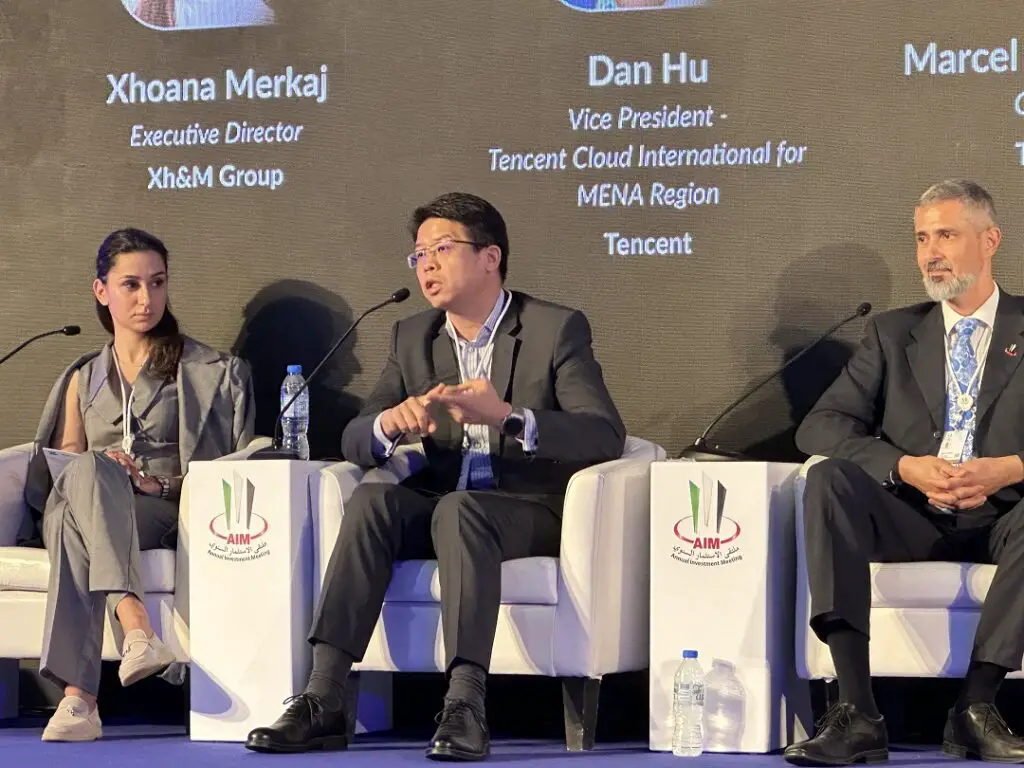- The cloud business unit of China’s tech giant Tencent is seeing a huge opportunity for growth in the Middle East region.
- At the moment, Gulf states are committing capital and policy support behind the vision of 4IR-driven economies.
- Tencent Cloud is offering a cloud-based platform for developing and distributing lightweight applications—mini-apps framework—within a digital ecosystem.
With the ambitious development of smart cities and other tech-based industries across the Middle East, the cloud business unit of China’s tech giant Tencent is seeing a huge opportunity for growth in the region.
Whether it is fintech applications based on the blockchain, vertical farms that use less water to grow food, or the manufacture of high-end electric and self-driving vehicles, Gulf states are committing capital and policy support behind the vision of 4IR-driven economies.
UAE has launched a digital economy
The UAE itself is at the forefront of the adoption of technology. With a view to enhance its digital capabilities and become the preferred destination for work, business, and leisure, the country has launched its digital economy strategy making tailwinds in its digital transformation.
“The country enjoys a unique position on developing its technological infrastructure and this is evident through its success in attracting Foreign Direct Investment. Dan Hu, Vice President, Middle East and Africa (MEA) Region, Tencent Cloud International told The Exchange Africa during the 12th edition of the Annual Investment Meeting in Abu Dhabi, UAE.
A robust e-public service system stands at the backbone of developing the infrastructure that can power a strong economy. The most crucial aspect of which is ensuring that it is inclusive for local residents.
For businesses, both local and international, reaching out to customers to offer services in the most convenient way has become very critical.
Tencent Cloud will deliver services better
With the changing technology landscape, telcos are deploying new products to help governments and businesses deliver services better.
Tencent Cloud is offering a cloud-based platform for developing and distributing lightweight applications—mini-apps framework—within a digital ecosystem aiming to help industries, businesses, and governments going digital.
In China, Tencent Cloud has contributed to the “smart” urban public services management by improving the quality of life for over 14 million residents of the bustling city of Guangzhou. Tencent Cloud’s technologies help in analysing and facilitating urban public service operations such as traffic and transportation in real-time.
Read also: Namibia among top global investment hotspots
In addition, Tencent Cloud’s offerings are powering tourism in China’s Yunnan province. The Yunnan government has been riding on “digitization” to accelerate the growth of the local tourism industry.
“The success story in Yunnan serves as a significant benchmark for firms as they seek to be part of the ongoing digital transformation of economies and industries in new frontiers such as the Middle East and North Africa (MENA)”, Dan Hu explained.
Tencent mini-app framework
“Consumers are getting more demanding. User experience needs to be seamless, secure, and hassle-free. This is where we come up with our mini-app framework to empower companies, service providers to meet those demands from the consumers,” Dan Hu noted.
During the 12th Annual Investment Meeting in Abu Dhabi, Tencent showcased the company’s mini-app framework that could help governments, companies, and industries to optimise their value proposition to millions of customers.
Currently, Gulf states are embracing Fourth Industrial Revolution technologies across industries as the region sprints to wean itself from dependence on oil.
UAE-based ride-hailing app Careem, which was acquired in 2020 by Uber, recently spun off its super app into a new start-up with financing from Emirati telecom giant e&.
In neighbouring Saudi Arabia, the government transferred a 4 percent stake worth about $80 billion in oil giant Saudi Aramco to Sanabil Investments, a Public Investment Fund (PIF)-owned firm that invests in start-ups.
The move signal’s Saudi government’s commitment to nurturing tech success stories as the country gears to become a global tech powerhouse.
By allocating $40 billion to Savvy Games, a subsidiary of the sovereign wealth fund with a mandate to make the kingdom the next game development and esports hub, Saudi Arabia is positioning itself on the path to tech success.
With ambitious projects on futuristic smart cities, gaming hubs, e-commerce and super app development, these mega projects in the Middle East are data-intensive in nature and require a robust and secure cloud infrastructure to underpin them.
“We see vast potential in the region. We are now in a phase of overseas development in terms of supporting countries with their national cloud strategies and companies with their vision of digital transformation,” Dan shared.
Tencent Cloud can boost tourism industry
Across industries, Tencent has set sights on Middle East’s booming tourism business. And you don’t have to look far to understand the firm’s ability in this sector. Back in China, Tencent’s GO-Yunnan app provides tourists with tourism information and services before, during, and after travel. Currently, the app has been downloaded over 12 million times by nearly seven million users.
Further, its Mini Program, embedded in Weixin, Chinese version of WeChat, has recorded over 30 million visits by over five million registered users. Combined, the app and its mini program served 150 million people as of July 2020.
Countries in the GCC region are adopting new strategies to attract tourists, enhancing the region’s appeal to international markets. Various initiatives to spur growth in the industry presents players in the business with the need to provide seamless services. Already, the Middle East is a top destination for holidaymakers from China.
Further, Gulf States are increasingly adopting digital strategies to accelerate growth in new growth sectors fintech and health-tech sectors. At the moment, regional countries are at different stages in rolling out emerging technologies such as 5G/6G, blockchain-based applications, 3D printing, and internet of things.
Further, digitising government services remains an equally important goal of Gulf states’ digital transformation plans. The UAE, for instance, has been a pioneer in the GCC in terms of digital transformation.
UAE moves data centre to Group 42 cloud
Currently, UAE aims to have one of the world’s most advanced digital government services. In 2021, authorities launched the UAE Strategy for Government Services.
In the same year, the Abu Dhabi Accountability Authority became the first UAE government entity to move its data centre to the Group 42 cloud and advance its AI capability across all of its digital operations.
During Tencent Cloud’s maiden participation in the Gulf Information Technology Exhibition (GITEX) last year, the tech giant said it’s exploring ways in which Tencent Cloud’s highly reliable, high-performance, and high-quality solutions can help public sector entities and businesses in the UAE and elsewhere in the GCC.
Mini-apps framework for telcos
Tencent Cloud’s mini-apps framework services could also see telecommunication companies and banks revolutionise their service offerings, said Dan Hu.
“In china and in some other countries, the bank app is more than a payment wallet. They (banks) would like you (customer) to explore more business opportunities such as loyalty programme, e-commerce, car-hailing, hotel booking.”
Overall, Tencent Cloud has 70 availability zones (clusters of data centres) spread in 26 geographical regions in five continents places it at a vantage point to drive the deployment of cloud solutions in the GCC.











